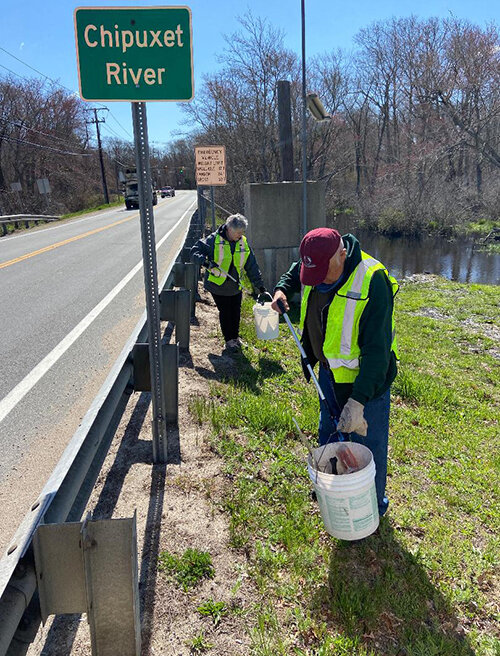New River Advocacy Group Works to Nip Pollution Problems
By FRANK CARINI/ecoRI News staff
Nips. Ubiquitous nips. These tiny and empty bottles of cheap
booze were omnipresent during a recent Earth Day cleanup in the village of
Wakefield.
A sampling of the nips collected during an April 24 riverside cleanup
in South Kingstown, R.I. (Courtesy photos)
Bill
McCusker doesn’t know how many he and the other 60 or so people picked up
during the three-hour cleanup, but it was a lot.
“They
were everywhere,” he said. “They were the main offender. Everyone was talking
about nips.”
A
bill was introduced
during the current General Assembly session to require a deposit, not less than
50 cents, on all nips sold in Rhode Island. There are also two bottle bills (H5280 and S0106) that require
deposits on all single-use beverage containers.
The
April 24 cleanup — two days after the official observance of Earth Day’s 51st
anniversary — was held by Friends of the Saugatucket and the Ministerial Road
Preservation Association. The latter is an all-volunteer community group
dedicated to preserving a scenic and historic road that dates back to the 17th
century. The former is a new all-volunteer organization created to promote the
well-being of the Saugatucket River.
McCusker and his wife, Elise Torello, are among the group of local environmentalists who thought it was time for the once-industrial river to have a guardian again.

Volunteers used kayaks to haul trash out of the Saugatucket River.
Friends of the Saugatucket was formed in
February and picks up where the Saugatucket River Heritage Corridor Coalition
left off 14 years ago. McCusker said the new group wants to build on the “great
work” and the “neat stuff” the coalition
accomplished from 2001-2007.
Sadly,
part of the Friends’ work includes cleaning up after others. The group’s first
Earth Day event picked up and hauled out 1,200 pounds of trash. The 32-person
effort — the Ministerial Road Preservation Association team had another 30 or
so volunteers — involved three people on kayaks on the Saugatucket River; a few
others donned waders, and the rest fanned out along the river’s banks and
tributaries and the sidewalks surrounding them.
“We
basically covered all of downtown Wakefield,” McCusker said.
 |
| Volunteers spent three hours cleaning up the village of Wakefield. |
Their reward was mostly plastic nips, bottles, and wrappers. McCusker said 70 percent to 75 percent of the collected trash was alcohol related.
He noted that more vodka and whiskey bottles are now made of plastic and that it’s cheaper to buy 10 nips than the smallest equivalent bottle.
Much
of the rest of the trash collected was fast-food debris. There also was COVID
masks and dog poop bags left filled for someone else to pick up.
“Plastics
are the problem,” McCusker said. “We can deal with glass, paper, and wood —
paper and wood rots — but plastics don’t go away.”
He
offered a few suggestions on how to lessen the amount of trash blowing around
our communities, such as better enforcement of littering laws and replacing old
trash cans with receptacles that have secure lids. He said enforcement could
start with making sure garbage trucks of all sizes have their loads covered.
Besides
picking up plastic and other trash, the new group’s broader mission is to
advocate for the river’s health. The Friends’ areas of focus are restoring the
river for herring passage, water-quality monitoring, stormwater mitigation, and
educational programs.
The
Saugatucket River has its headwaters in North Kingstown. It then flows south
through South Kingstown into Point Judith Pond and ultimately into Block Island
Sound. Its 11,000-acre watershed is a mix of woodland and suburban and urban
development. The river and its tributaries are obstructed by several dams.
While
the Friends of the Saugatucket River work on becoming a registered nonprofit,
the Charlestown-based Salt Ponds Coalition
is the group’s fiscal sponsor.